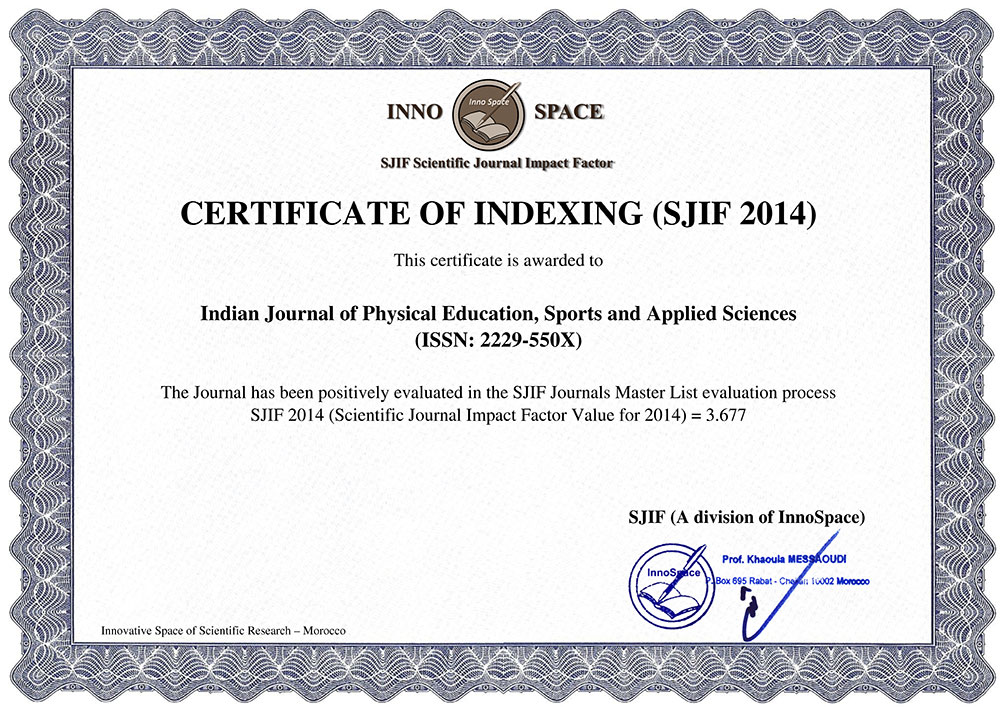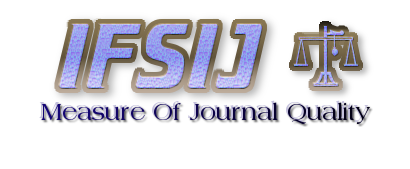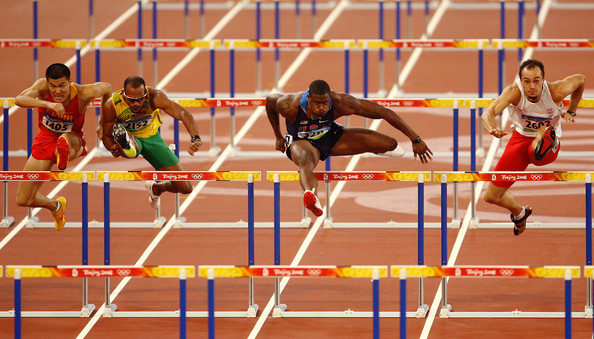PROBLEMATIC SOCIAL BEHAVIOUR SKILLS IN EARLY ADOLESCENCE : WITH REFERENCE TO SPORTS PARTICIPATION
2020, July, Volume 10-Number 3 October 6, 2020| Author name : | Anil Kumar1 & Dr. Yuwraj Shrivastava 2 | ||||
|---|---|---|---|---|---|
| Page no : | 09-12 | Volume : | 10 | Issue : | 3 |
doi no.: 05-2016-44975451, DOI Link :: http://doi-ds.org/doilink/10.2020-77118453/
Anil Kumar1 & Dr. Yuwraj Shrivastava 2
Affiliations:
1 Advanced Postgraduate Student, Department of Physical Education, Dr. CV Raman University, Kargi Road Kota Bilaspur C.G.
2 Associate Professor, Department of Physical Education, Dr. CV Raman University, Kargi Road Kota Bilaspur C.G.
ABSTRACT
The main objective of this study was to compare problematic social behavioural skills among adolescent player and non player boys. The sample of this study was chosen to fulfil the major objective of this work. 50 player boys in their early adolescence were selected. The age range of these subjects in their early adolescence was 13 to 15 years. Those school-going boys in their early adolescence period with participation in district level sports participation were selected. Apart from this, 50 non-player boys in their early adolescence were also selected. The age range of these subjects in their early adolescence was 13 to 15 years. The chosen adolescent player boys average age was 14.11 years while the average age of adolescent non-players boys was 14.21 years. To select 100 school-going boys purposive sampling was used. Social skills problem behaviour checklist compiled and standardized by Madhu Mathur and Saroj Arora (2005) was thought suitable for this study. Results indicate about lower problematic social behavioural skills in adolescent player boys as compared to adolescent non player boys. It was concluded that problematic social behavivour skills in adolescent can be managed by ensuring their involvement in competitive sports.
Keywords : Problematic social behaviour skills, adolescence, competitive sports .
DOWNLOAD FULL TEXT: 
BIBLIOGRAPHY
Bakker, M. P., Ormel, J., Lindenberg, S., Verhulst, F. C., & Oldehinkel, A. J. (2010). Generation of interpersonal stressful events: The role of poor social skills and early physical maturation in young adolescents – The Trails study. Journal of Early Adolescence, 20(10): 1-23.
Bandura, A. (1971). Psychological modelling, Hawthrone, NY: Aidine Altherton.
Cecconello, A. M., & Koller, S. H. (2000). Competência social e empatia: um estudo sobre resiliência com crianças em situação de pobreza. Estudos de Psicologia (Natal), 5(1): 71-93.
Ford, M.E. (1982). Social, Cognitive and Social Competence in Adolescence. Development Psychology, 18 :322-241.
Mondal, M. and Patar, S. (2015). Studies on Adjustment Pattern of School Going Athletes and Non-Athletes. International Journal of Physical Education, Sports and Health ; 1(6): 148-151.
Madhu Mathur and Saroj Arora (2005) Social skills problem behaviour Questionnaire, National Psychological Corporation Allahabad Bank, Belanganj, Agra
Riggio, R. E., Widaman, K. F., & Friedman, H. S. (1985). Actual and perceived emotional sending and personality correlates. Journal of Nonverbal Behavior, 9 : 69-83.
Segrin, C., & Flora, J. (2000). Poor social skills are a vulnerability factor in the development of psychosocial problems. Human Communication Research, 26(3): 489-514.
Sheikhi, S., Peymanizad, H., Yadolazadeh, A. and Karbalaei, M. (2012). Comparison of behavioral disorders of female athletes and non-athletes in Zahedan secondary schools. European Journal of Experimental Biology, 2 (6):2372-2377.
Singh, D.; Sing, A. and Singh, S. (2013). A comparative study of sports personology between sports-persons and non sports-persons. International Journal of Behavioral Social and Movement Sciences, 2( 2): 184-191.







